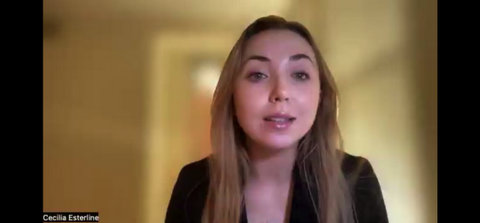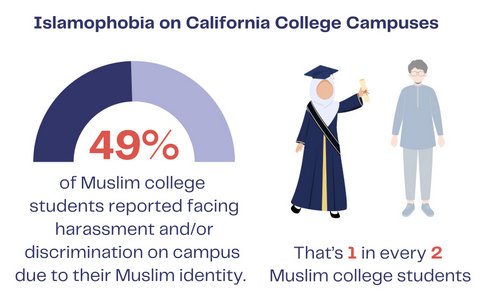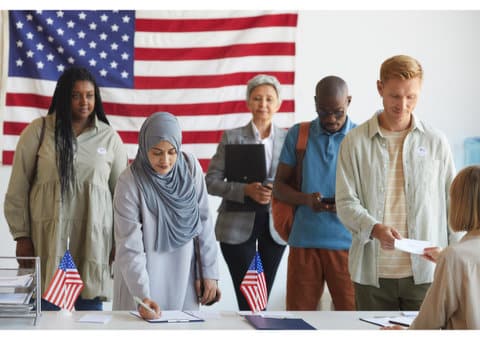
05 Aug Trump Return to Power Would Spell Trouble for Immigrants, Experts Say

Cecelia Esterline, immigration research analyst at the Niskanen Center, was one of the panelists for an Ethnic Media Services briefing on the potential immigration-related impact of a second Donald Trump presidency. (Screenshot captured by Joe Porrello / The CC Pulse)
By Joe Porrello
If Donald Trump serves a second term as U.S. president, major changes to the immigration system should be expected, experts say.
Separating families at the border and imposing a Muslim ban were just some of the things Trump initiated during his time as president.
Immigration specialists speaking at an Ethnic Media Services press teleconference on June 14 say, if elected, Trump would not only revamp prior xenophobic laws undone by President Joe Biden and his administration but also use executive power to take the intolerance and subsequent economic harm a step further.
>>>From Our Archives: Biden’s ‘Aggressive’ Immigration Reform Reverses Many Trump Policies, But Not All<<<
Potential change would include but not be limited to: massive deportations and detention camps, as well as putting freezes on legal immigration categories. Legal residents and citizens who live or study with an undocumented person could also face discipline.
Experts say many of the details for Trump’s plan can be found in Project 2025, a right-wing vision for the next administration, published by the politically conservative Heritage Foundation.
According to Cecelia Esterline, immigration research analyst at the leftist think tank Niskanen Center, the mandate for leadership includes policy reforms across all agencies and levels of the federal government.
She said Trump implemented over half of prior recommendations from the Heritage Foundation during just his first year in office.
In February, the center published a report highlighting over 175 proposed immigration policy changes in Project 2025, many of which she says have public support.
“The threat of these policies being the foundation for a second term is very real,” said Esterline.
The foundation and its project, she says, appeal to those whose political goals ignore the consequences of the plan’s implications.
“These policies really abandon traditional conservative values like supporting business growth and development, decentralizing power away from the federal government, and decreasing bureaucratic hurdles,” Esterline said.
One specific aspect she noted is the importance of H2A and H2B visas that sustain numerous industries for temporary or seasonal work. With the prospect of said visas being drastically reduced by Trump, Esterline says businesses relying on them would take a “massive blow.”
In addition, any immigration category deemed to have an excessive backlog would be cut off from new applications. “However, ‘excessive’ is neither defined nor clarified,” said Esterline.
She added that procedural hurdles, which create new or deeper backlogs, could trigger further cutoffs. For example, application approvals could have to be processed through a secondary office.
>>>From Our Archives: After Escaping Abuse, Immigrant Victims Forced to Endure Long Waits With Little Hope<<<
A disruption of power balance among state and federal governments, Esterline says, could come in the form of mandatory information sharing and using the withholding of funding to “bully states and localities into compliance with priorities of the administration.”
As an illustration of such bullying, she says Project 2025 directs the Department of Education to deny loan access to all students at schools that offer in-state tuition to undocumented immigrants
“It’s more likely that states and universities would be forced to revise their laws in order to maintain U.S. citizen students’ access to critical financial aid,” said Esterline.
David Bier, director of immigration studies at the Cato Institute, says the proposed immigration changes of Project 2025 and Trump include deploying military in areas their agenda is in question.
“They want to use state and local authorities as a force multiplier because there aren’t enough ICE agents to do this,” he said, referring to Immigration and Customs Enforcement. “There is concern about him ignoring the Constitution, ignoring court decisions, potentially legalizing the use of deadly force at the border.”
A Supreme Court many have recently called corrupt, Bier says, adds concern.
“It takes a backbone from the courts to stand up to the president, in particular, one who’s threatening to violate orders,” he said. “Once you go down that road, the Supreme Court is on the verge of becoming irrelevant.”
According to Bier, the refugee program once reduced by roughly 90% could see increased reductions. He said about 10,000 refugees were admitted to the U.S. during Trump’s last year in office, compared to an estimated 100,000 in the final year of President Biden’s first term.
“All of the Biden administration executive actions that have made legal immigration easier… are going to be rescinded almost immediately,” said Bier.
A rise in illegal immigration would accompany Trump’s election, according to Bier, despite new processes in place that have mitigated such activity. He says regardless of laws in place, people adjust and find new ways to accomplish their move.
“We know these migration patterns are not controlled by who’s in office, it’s controlled by economic insecurity necessities of the individuals who are traveling and the availability of jobs and opportunity here in the United States… That’s not likely to change,” said Bier.
>>>Read: Response to Immigration Crisis Largely Ignores Root Causes<<<
He pointed to the highest total of border patrol arrests going back to 1999 being recorded during Trump’s last month in office and the number of immigrants held in detention reaching its climax in 2019 at around 20,000. The detention centers often had no accommodations for sleep, sanitation, security or medical care.
Zachary Mueller, senior research director for America’s Voice Education Fund, says Trump and other Republican candidates are “actively campaigning on calls to round up, detain and deport 15 to 30 million people.”
He cited Thomas Homan, a former police officer and government official who served during the Trump administration as ICE director, who said during a Trump rally in regard to new detainment and deportation policies, “Everyone is on the table.”
According to Mueller, 80% of undocumented immigrants who have called the U.S. home since 2010 would be at risk.
“The havoc brought by this plan will not be contained to those who lack legal status,” he said. “I think we’re also going to see folks not fitting the look of quote, ‘real Americans,’ become the target for massive harassment under this scheme.”
Despite terrorism rising domestically in the form of white nationalism over the last decade, Mueller noted Trump saying immigrants are “poisoning the blood of our country.”
“Immigrants and calls for their deportation, and their descriptions, and their dehumanization, is leading to some other serious concerns for American democracy and our public safety,” he said.
Republican candidates have spent $190 million on traditional and connected TV advertisements featuring anti-immigrant rhetoric or negative immigrant messaging in 2024, according to Mueller.
Esterline conversely noted the recent progress of Biden in terms of immigration policy. She cited more non-immigrant visas being issued by the State Department in the first half of fiscal year 2024 than any year previously during the same period.
Regardless of who is elected U.S. president in November, Esterline says there is a need for “comprehensive bipartisan immigration reform that has yet to come to fruition in Congress.”






No Comments